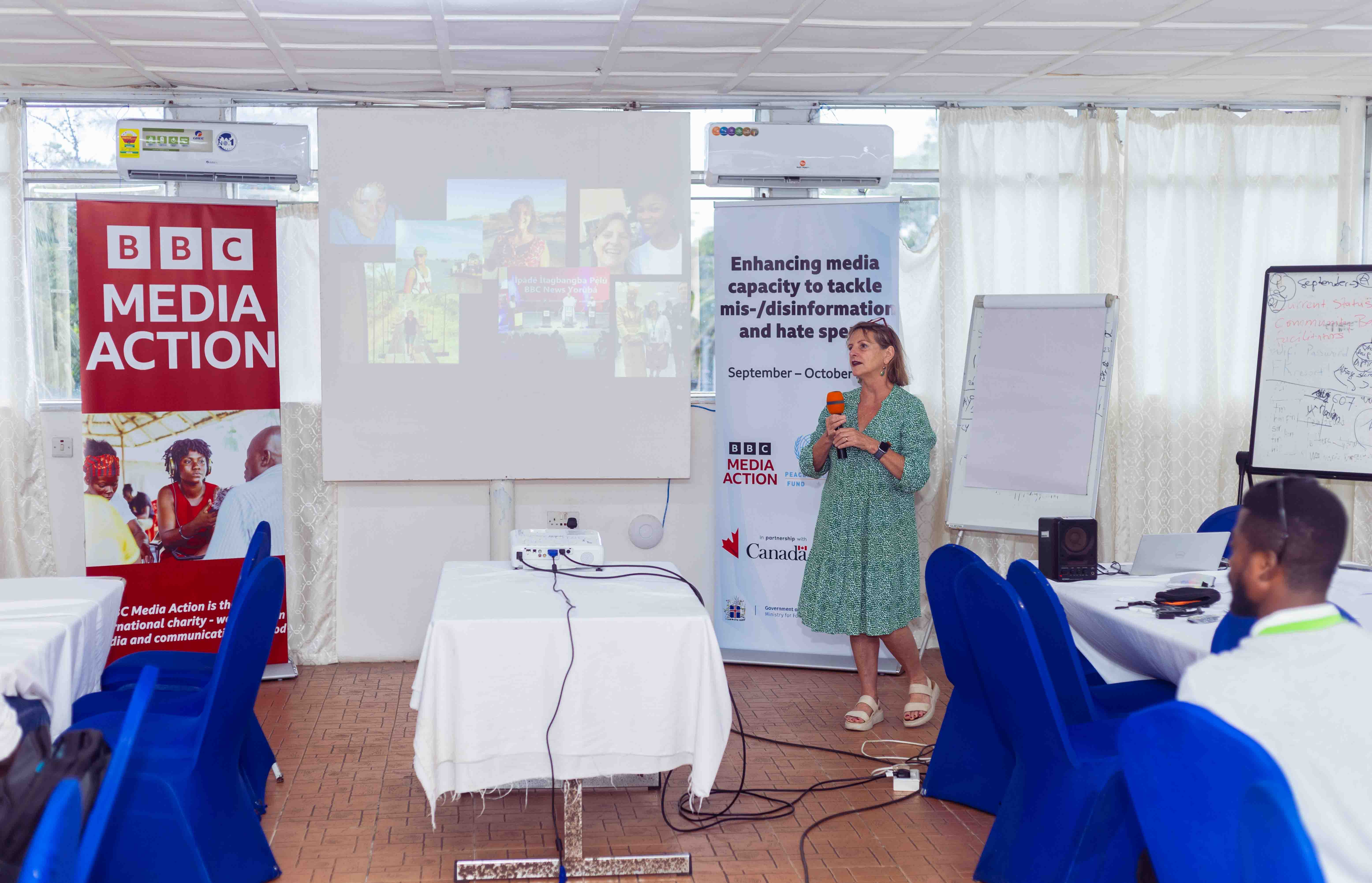UNDP supports the empowerment of Journalists and Influencers to combat mis/disinformation in Sierra Leone
October 15, 2024

A participant at the training for Sierra Leonean journalists and influencers.
Misinformation and disinformation continue to pose significant challenges to Sierra Leone’s media landscape, even after the 2023 elections. In response, UNDP Sierra Leone in partnership with BBC Media Action, launched a series of targeted training sessions as part of the iVerify[1] initiative, designed to strengthen the capacity of journalists, fact-checkers, and social media influencer's in tackling false information and hate speech.
These training sessions are part of a broader strategy to address the growing problem of information disorder, which has the potential to mislead the public. By equipping media professionals with the skills and tools they need to fact-check and report accurately, this initiative seeks to promote a more informed and resilient society in Sierra Leone.
The first round of training, “Core Advanced Training and Mentoring,” was conducted in two phases: from September 19 – 22 and September 30 – October 3. It was aimed at 25 mid-career and senior journalists from various media outlets, including fact-checkers from the iVerify team. Participants represented a diverse range of platforms, including television and radio stations, newspapers, and digital outlets. The media outlets in Sierra Leone represented in the training included Gbla Online TV, Sierra Check, AYV Makeni, SLBC Makeni, Politico Newspaper, Calabash Newspaper, Fritong Post Newspaper, Radio Maria Makeni, Classic TV Bo, Slik TV, CJID, and Salone Messenger. The training, which featured nine female participants and sixteen male participants, covered advanced fact-checking techniques, the creation of public interest digital content, and the development of media literacy materials.
The training, held in Freetown, was led by Lazar Covs, a journalist from BBC Serbia and Marie Helly, a veteran journalist with over 35 years of experience at the BBC. Together, they provided participants with cutting-edge fact-checking tools and techniques to debunk false information, analyze digital content, and create high-quality, trustworthy reports.
[1] iVerify is a global digital media monitoring platform developed by UNDP to help national actors identify, monitor, and respond to information integrity threats. Supported by the UNDP Chief Digital Office (New York) and the Joint Task Force (Brussels), iVerify in Sierra Leone is part of a larger Elections Project, aimed at promoting verified information, media literacy, and electoral education for the June 2023 elections and beyond. Website: iVerify Sierra Leone - Separating truth from fiction for breaking news in Sierra Leone - iVerify Siera Leone (i-verify.org)

A cross section participants at the training for Sierra Leonean journalists and influencers.
For Iris A. Bangura, a 23-year-old TV journalist with SLIK TV, the training is crucial in her career. She reflected on the important role journalists play in providing the public with reliable information: “People rely on us for credible information, and we are the eyes and ears of the public,” Iris explained. “But with the spread of misinformation, it’s harder than ever to get the facts right. This training has given me the tools to fact-check stories, and now I feel more confident in ensuring the accuracy of my reports.”

Marie Helly , a veteran journalist with the BBC
George Baratashvili, Chief Technical Advisor for UNDP Elections, underscored the significance of media literacy training, stating, “In today’s digital age, misinformation spreads faster than ever before. Our commitment to media literacy training is an essential step toward building a cadre of journalists so people can trust what they read, see, and hear in the news.”
The training focused on mastering storytelling techniques and equipping participants with the skills to create engaging content that counters harmful narratives. Journalists and influencers learned how to produce compelling stories that challenge disinformation while maintaining journalistic integrity.
Later in the month, an additional 35 journalists and social media influencers will participate in the second round of training, to be held in Makeni. This “Extended Training” will further enhance the skills needed to identify, verify, and combat mis/disinformation, with a focus on audience engagement and the creation of accurate, impactful content.

Edward Kargbo, Country Director of BBC Media Action Sierra Leone and Ethiopia, stressed the long-term impact of these efforts. “By empowering journalists and bloggers with these skills, we hope to improve the quality of reporting across the media landscape, leading to a ripple effect that reaches the communities they serve,” Kargbo said. “This initiative is not only about improving individual journalists’ abilities but about fostering a more trustworthy and informed media environment overall.”
For many participants, the training provided a deeper understanding of the scope and impact of mis/disinformation and hate speech on Sierra Leonean society. By acquiring fact-checking skills and learning to use new tools, journalists are now better equipped to play a vital role in curbing the spread of false information and promoting a more accurate, transparent media landscape.
Thanks to these training initiatives, journalists like Iris and her colleagues are now better prepared to tackle the challenge of misinformation head-on, ensuring that information integrity is fostering a stronger, more resilient media environment in Sierra Leone.
iVerify and the BBCMA media literacy training programme is part of UNDP’s Elections Project “Fostering Peaceful, Credible, and Inclusive Elections in Sierra Leone 2022-2023” which is administered thanks to generous contributions from the Government of Ireland, the European Union, the Government of Canada, the Government of Iceland, UNDP, and the United Nations Peacebuilding Fund.

 Locations
Locations



